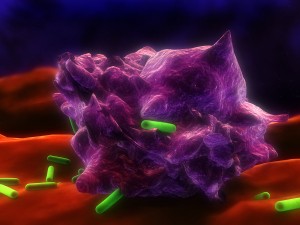This disease is caused by an NLRC4 genetic mutation that leads to the patient having serious flares of symptoms that are similar to, or a form of a macrophage activation syndrome (MAS). Of note, these patients not only have the fevers, and a MAS-like disease, but significant and life threatening gastrointestinal inflammation from early infancy onward.
Key features of NLRC4-MAS autoinflammatory disease:
- Recurrent fevers starting at a very young age (infancy)
- Joint pains; arthritis noted in and adult patient
- Rashes that vary between an evanescent rash with dermatographism present on occasion, to a notable urticarial rash during flares of disease
- Gastrointestinal issues including vomiting, diarrhea, duodenitis, inflammatory infiltrates in the intestinal tissues, neonatal-onset enterocolitis
- Failure to thrive or poor weight gain
- Recurrent signs and symptoms of a macrophage activation syndrome-like disease, including organ and lab changes
- Enlarged spleen (splenomegaly)
- Transaminitis (elevated AST/ALT liver labs and liver inflammation)
- High risk for inflamed organs, and organ failure during MAS-like flares
- Labs noted during MAS-like episodes and flares of disease symptoms include:
- Elevated C-reactive protein (CRP) and serum ferritin levels (extreme hyperferritinemia) during flares of MAS
- high triglycerides
- Overproduction of Interleukin 1β (Il-1β) and Interleukin 18 (Il-18)
- Decreased labs: hemoglobin levels, platelet count (during MAS-like episodes)
- Low levels of NK cells
- Also anemia and leukopenia noted
In this video from the National Institute of Arthritis and Musculoskeletal and Skin Diseases (NIAMS) at the National Institutes of Health (NIH), Dr. Adriana Almeida de Jesus, M.D., Ph.D., a researcher at NIAMS, talks about the symptoms of this patient with a newly classified autoinflammatory disease due to a NLRC4 genetic mutation, and how they identified this new disease.
Another NIAMS researcher, Dr Scott Canna, M.D., outlines their process of caring and treating this patient and how this new research may help doctors to understand other autoinflammatory diseases.
Here Dr. Canna discusses what has been learned about Il-18 in NLRC4 –
Both of these videos and a very good description of this new disease and the research are at this link on the NIAMS website.
This information page about NLRC4 from Sick Kids Toronto is very well done and puts the complex information about this rare autoinflammatory disease into a very insightful, easy to understand format.
Here is a publication on this child’s case in Nature Genetics from September 2014. Also, this article was published in the same journal about a family with this mutation, and similar but even more severe organ involvement from NLRC4-MAS, also referred to as SCAN4.
In addition, there was a nice feature article in Medpage Today discussing both of these journal articles that summarizes the main features in the patients that have been found to have this mutation.
This abstract from a poster presentation by Dr Canna in March 2014 at the American College of Rheumatology Pediatric Rheumatology Symposium (PRYSM) was the first time that we saw published research about this newly identified autoinflammatory disease associated with periodic fevers and macrophage activation syndrome (MAS). We had heard about this case, because the family is involved in our patient community, and were eagerly anticipating the debut of this finding in the medical world.
References
- Arthritis Rheumatology: PRYSM abstract A157: Macrophage Activation Syndrome-like Illness Due to an Activating Mutation in NLRC4.
- The National: Medical teams uncover previously undiagnosed autoinflammatory disorder.
- Medpage Today: New inflammatory diseases seen.
- Nature Genetics letter:An activating NLRC4 inflammasome mutation causes autoinflammation with recurrent macrophage activation syndrome.
- Nature Genetics letter:Mutation of NLRC4 causes a syndrome of enterocolitis and autoinflammation
- NIAMS Research brief September 2014:Gene Linked to Potentially Life-Threatening Autoinflammatory Disorder
- SickKids Toronto Newsroom: Genetic testing uncovers unknown autoinflammatory disorder in SickKids patient, leads to successful targeted therapy: new research.
- WTNH.com news 8: Death of an infant solves medical mystery
* Macrophage photo by Eraxion/Bigstockphoto.com






